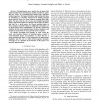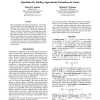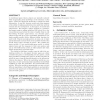82 search results - page 12 / 17 » Nash equilibria set computing in finite extended games |
CDC
2010
IEEE
13 years 2 months ago
2010
IEEE
Potential games are a special class of games that admit tractable static and dynamic analysis. Intuitively, games that are "close" to a potential game should enjoy somewh...
AMAI
2004
Springer
14 years 23 days ago
2004
Springer
This paper extends the framework of partially observable Markov decision processes (POMDPs) to multi-agent settings by incorporating the notion of agent models into the state spac...
SIGECOM
2010
ACM
14 years 5 days ago
2010
ACM
This paper studies —from the perspective of efficient computation— a type of competition that is widespread throughout the plant and animal kingdoms, higher education, politic...
AAAI
2010
13 years 7 months ago
2010
Many computational problems in game theory, such as finding Nash equilibria, are algorithmically hard to solve. This limitation forces analysts to limit attention to restricted su...
SIGECOM
2006
ACM
14 years 1 months ago
2006
ACM
In traditional game theory, players are typically endowed with exogenously given knowledge of the structure of the game—either full omniscient knowledge or partial but fixed in...



